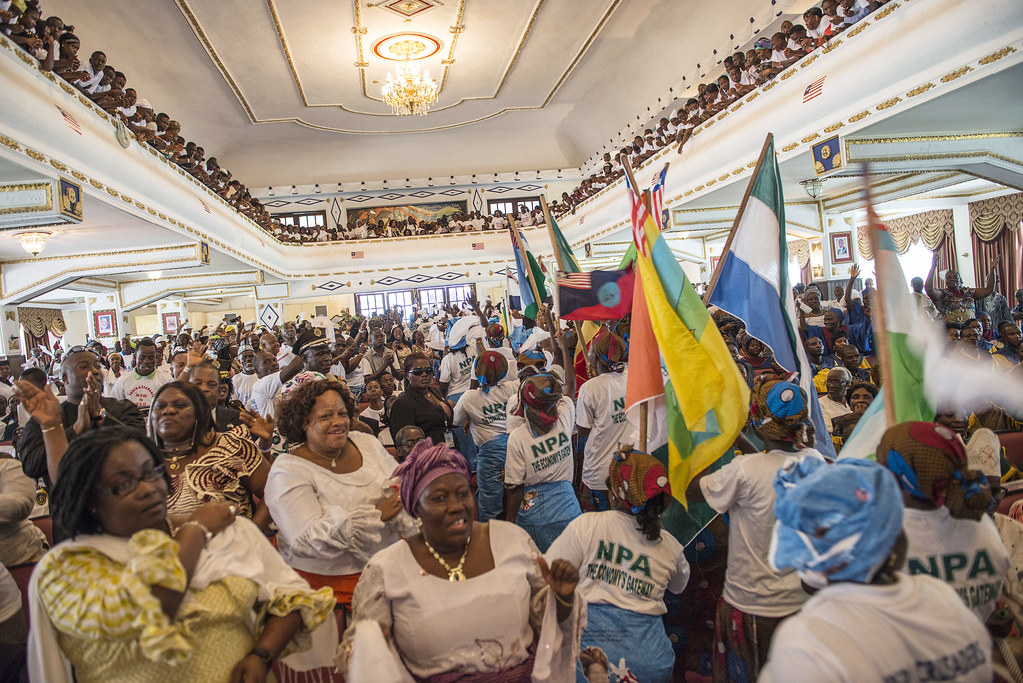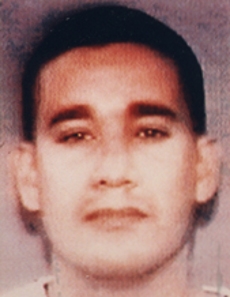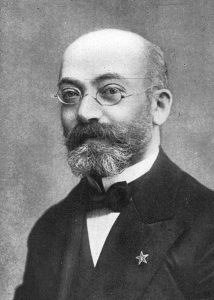A story of power, persistence, and peace

A sea of women singing and dancing in fields, on streets, and neighborhoods, completely elated with the news that peace had finally been won! Women with matching white t-shirts with the words, “Peace, yes! War, never again!” written on their backs. The words on their shirts finally achieved, and hope for change blowing like cool refreshing breeze on their faces. The sounds of cheers, joyful songs, and even tears of joy heard throughout the country of Liberia in the year 2003 when the violent, painful, and devastating series of civil wars had finally been stopped for good by these women’s perseverance and actions.1 The women’s movement ended ended fourteen years of bloodshed war fueled by political corruption. This diverse and powerful group of women grew tired of waiting for male leaders to bring peace and took matter in their own hands. The Women of Liberia Mass Action for Peace Movement is credited with ending many years filled with conflict and violence throughout Liberia. This strong movement made up of mothers, daughters, aunts, and grandmothers put an end to the senseless civil war in Liberia.2 These same women who celebrated a sweet victory of peace, earlier that same year had organized a sit-in to pressure Liberian government officials to agree to a peace deal for the nation. Their tireless work began long before peace became a glimmer of reality.
Liberia is a country of extreme poverty and falls on the list of Least Developed Countries according to the United Nations. The United Nations evaluates countries on this list by looking at their per capita income, human assets, and economic vulnerability. Initially when the colony of Liberia was founded, the United States had a large role to play. 3 In 1822 the American Colonization Society founded the colony of Liberia with the intent of relocating newly freed Black slaves from the United States to the continent of Africa.4 The United States did not want so many freed slaves to continue living in the states, thus forcing them to leave and forcefully settle on an unfamiliar continent. There was much disagreement from United States officials and African tribe leaders, leaving these freed slaves in an uncomfortable and dangerous situation of not having a permanent home. Once an agreement was reached, these newly freed slaves were allowed to stay in West Africa despite their lack of knowledge of the area, culture, or people. They had to assimilate to the culture, and many of them died from malaria soon after arriving.5 The United States did not provide much support for the newfound colony, thus giving the country of Liberia a very difficult beginning with no true foundation.
[TW: Violence, sexual assault, substance abuse.]
This difficult start to the country manifested itself through a poor economy, lack of infrastructure, extreme poverty, weak institutions in the areas of health and education, as well as recurring political unrest. Dictator Charles Taylor and the violent crimes, torture, and great divide his actions inflicted on Liberia further fueled this unrest. He served as the 22nd President of Liberia and has since been convicted as a war criminal. Taylor served as President from August of 1997 until his forced resignation in August 2003 that ended the country’s second civil war. In the year 2012, Taylor was found guilty of aiding and abetting a notoriously brutal rebel force who murdered, raped, and forced sexual slavery, build a child army, and mined diamonds to pay for guns.6 His conviction was the first for war crimes by a former head of state in an international court since the Nuremberg trials of Nazi leaders after WWII. Amidst all of these violent crimes, he was not just aiding a rebellion within the country.
Over the course of a decade long civil war, over 50,000 people were killed, thousands more went missing, plus the countless who were injured. The rebels under the leadership of Taylor amputated limbs, raped women, enslaved survivors, and forced boys to join child armies. After being forcibly taken into these armies, the children were addicted to drugs and became soldiers, desperate to get the next fix of these substances. The use of these drugs with the young boys was a control tactic to ensure they were dependent on army leaders to fulfill their addiction. Women, especially young daughters, were taken as sex slaves for the male soldiers in the night and then forced to fight in armies during the day. Many people were murdered in their own homes in front of their children and loved ones.7 Through his leadership, Charles Taylor inflicted pain, violence, and immense conflict on the country as a whole, impacting every man, woman, and child.
After years of unnecessary and cruel violence, the women of this dismantled country had had enough.

The same women who were seen as second class citizens, objectified, assaulted, and broken down knew change had to begin with them. These women were mothers who saw their young sons forced into violent child armies, their daughters were kidnapped and raped, their husbands often did not return. They carried the weight of their family’s pain. These women were mothers, daughters, aunts, and grandmothers. For their own safety, for a future for their families, and for the country, they knew that they would have to find a solution to bring peace. They knew they had to lead by example, unite to find power in numbers, and advocate not only justice but also for peace.8
The Liberia Mass Action for Peace Movement was founded and supported by an organization based on Ghana, Africa known as The West African Network for Peacebuilding, which branched out to from another key association, the Women in Peacebuilding Network (WIPNET). The purpose of WIPNET is to empower, educate, and stand in solidarity with African women who experienced systemic violence and injustices. The goal in the organization’s involvement is to utilize the numerical strength of women groups, educate, and mobilize them to combat these systemic injustices they are facing within their country. WIPNET operated by holding workshops on topics such as conflict resolution and mediation in an effort to build community and empower marginalized groups of women.9 Leymah Gbowee, a Liberian peace activist and leader within WIPNET, became responsible for the organization or this movement. Gbowee and her allies spent months traveling throughout Liberia visiting mosques, markets, and churches to organize and mobilize women for this peace movement. She spoke to thousands of small groups of women and little by little created a wave of nonviolent activism amongst those who remained invisible either subjected to violence or rendered invisible by their male counterparts. These women hungered for change. While Liberia had its share of tension between different religions and beliefs, women of all backgrounds united together in this campaign. Women from Muslim and Christian backgrounds, from a wide array of social classes, and with unique personal backgrounds, united through their shared experiences, pains, and and hope for change to form the Women of Liberia Mass Action for Peace. By April 2002, they had founded their movement and by the late summer that same year, Gbowee became their leader.10

The Women of Liberia Mass Action for Peace Movement held daily non-violent demonstrations in defiance of orders from Charles Taylor. They would gather in fields, on streets, and anywhere public so that their statement were both seen and heard. They chose White as the color for their movement to represent their hope for peace to other African leaders. After much pressure from the women, and consistent uprising, Taylor agreed to attend peace talks with other African leaders to begin peace negotiations in Ghana. When the peace talks began, the women moved their demonstrations to the hallways of the presidential palace where these men met.11 They sat outside of meeting rooms, blocked exits and windows, and would not let leaders leave until an agreement was reached. Nearly 200 women staged this sit-in at the presidential palace and helped apply pressure to create a resolution. The pressure they exerted on African leaders successfully led to the signing of the 2003 Comprehensive Peace Agreement. The agreement forcibly removed Charles Taylor from office. These peaceful women warriors felt a sigh of relief. Women had won PEACE.
The efforts to maintain this new peace continued in Liberia after the signing in 2003. The period of time leading up to the 2005 presidential election was a crucial one for the country, in order to ensure a leader who would cherish the peace could be elected. Women held voter education drives and civic engagement initiatives throughout Liberia to ensure voters would not only participate but were well informed at the polls. The wave of self empowerment that began with Leymah Gbowee transcended throughout the country as people knew their vote and voice mattered and could indeed enact change. With this new wave of activism in a post war climate, Liberia ushered in their first woman president of an African Country: Ellen Johnson Sirleaf. Upon winning the election, President Ellen Johnson Sirleaf encouraged women to continue to use their voice and be active political participants. She reminded them of their power.12

One cannot downplay the challenges that the 2014 Ebola outbreak and the current Covid-19 pandemic have inflicted on the country of Liberia. However, since women led a peace movement, Liberia has been war free. While maintaining peace, the country has also worked to improve infrastructure, education, medical resources, and strengthen core leadership in government. Strengthening of core leadership and transition of government cannot be done overnight. It took years of resistance, fighting, and overcoming violence in order to reach this newfound peace. In 2011, the women leaders of the movement shared the Nobel Peace Prize. Yet one cannot forget that a large number of lives were lost throughout the country, a majority of which were senseless deaths. Men, women, and children lost their lives and loved ones throughout the repeated civil wars. These deaths did not only alter the country, but relationships and family dynamics forever. Liberia can now beam as the light at the end of the long painful tunnel of war. Without strong, determined, and sacrificing women, peace could not have been achieved! The work of everyday mothers, grandmothers, aunts, sisters, and daughters, won lasting peace. There is great power in these women. Power that no amount of evil could overtake.
- Erica Lawson, “How Women Bring about Peace and Change in Liberia,” The Conversation. Accessed April 22, 2021. https://theconversation.com/how-women-bring-about-peace-and-change-in-liberia-86670. ↵
- Hook, Stephanie Van, “Transforming Anger into Nonviolent Power,” openDemocracy. Accessed April 22, 2021. https://www.opendemocracy.net/en/transformation/transforming-anger-into-nonviolent-power/. ↵
- “Least Developed Countries (LDCs) | Department of Economic and Social Affairs.” United Nations. United Nations. Accessed May 25, 2021. https://www.un.org/development/desa/dpad/least-developed-country-category.html. ↵
- “Founding of Liberia, 1847,” U.S. Department of State. U.S. Department of State. Accessed May 3, 2021. https://history.state.gov/milestones/1830-1860/liberia. ↵
- “History Of Liberia: A Time Line,” The Library of Congress. Accessed May 3, 2021. https://www.loc.gov/collections/maps-of-liberia-1830-to-1870/articles-and-essays/history-of-liberia/1820-to-1847/. ↵
- “Former Liberian President Charles Taylor Found Guilty of War Crimes,” History.com, A&E Television Networks. Accessed May 3, 2021. https://www.history.com/this-day-in-history/former-liberian-president-charles-taylor-found-guilty-of-war-crimes. ↵
- “How the Women of Liberia Fought for Peace and Won,” Tavaana. Accessed May 8, 2021. https://tavaana.org/en/en/content/how-women-liberia-fought-peace-and-won. ↵
- “How the Women of Liberia Fought for Peace and Won,” Tavaana. Accessed May 8, 2021. https://tavaana.org/en/en/content/how-women-liberia-fought-peace-and-won. ↵
- “WIPNET – West AFRICA Network FOR Peacebuilding (WANEP).” Accessed April 21, 2021. https://wanep.org/wanep/wipnet/. ↵
- icdblogsphereteam, Posted by. “The Women of Liberia Mass Action for Peace: Women Can Make the Difference.” Cultural Diplomacy in Africa. Accessed May 23, 2021. https://culturaldiplomacyinafrica.wordpress.com/2013/05/23/the-women-of-liberia-mass-action-for-peace-women-can-make-the-difference/. ↵
- icdblogsphereteam, Posted by “The Women of Liberia Mass Action for Peace: Women Can Make the Difference” Cultural Diplomacy in Africa. Accessed May 23, 2021. https://culturaldiplomacyinafrica.wordpress.com/2013/05/23/the-women-of-liberia-mass-action-for-peace-women-can-make-the-difference/. ↵
- “Women: Liberia’s Guardians of Peace | Africa Renewal.” United Nations. United Nations. Accessed May 1, 2021. https://www.un.org/africarenewal/magazine/april-2018-july-2018/women-liberia%E2%80%99s-guardians-peace. ↵



10 comments
LEE
This article is very interesting. I like this topic talking about woman in Liberia. The Women of Liberia Mass Action for Peace Movement is credited with ending many years filled with conflict and violence throughout Liberia. I am really interested in discussing about this topic. I wanna share this article with my friends in this moment. Thank you for sharing good article.
Makayla Soto
I found this article interesting because I’m very into reading and understanding social injustices and issues. This article did a great job explaining the justice for Liberia and all the issues it’s been through. With women’s rights to poverty and class. This article covered everything. They also did a good job with going into the historic background of these issues and how much has evolved since then.
Andres Ruiz
As an American, news from Liberia is sparse. Many news stations do not cover the crises and goings on in poor countries. However, news like this reminds me that there is a bigger world out there. A world where a country torn apart by civil war and strife can be brought together. I dont think I ever saw something like this, save for something like India, where peace brought about longstanding change. I love stories like this because they remind us that violence isnt always the answer.
Tomas Salazar
I had no idea of this occurring in Liberia, but found this extremely interesting. The power these women possessed in the constant civil wars needs to be spoken about more. I enjoyed reading about how Ellen Johnson Sirleaf came out as victorious in the election and still chose to encourage women. The article displays perfectly on how influential women can be.
Camryn Blackmon
Hi Alison, this article was written so well, especially for covering such traumatic and sensitive topics. Before reading the article, I had no idea any of this happened in Liberia, so it is really powerful that you could write about it and spread awareness. I really appreciate you talking about this subject and including details like the historical background and timeline of events.
Claudia Sanchez
Hello Alison, Amazing article that covers how women can be the pushing guide for peace in a nation. I was not aware about the crisis occuring in Liberia, but this article was really informative and respectful. This article is a wonderful motivator for how influential women are in a society adhow the true heros of a nation are those that stick together to fight toether. Liberia is not the only country to deal with civil war and senseless deaths so they can now be a beam of hope.
Daniela Iniguez-Jaco
Inspiring article! I love reading stories about women empowerment! It is truly amazing to read how these Liberian women stood up against all of the abuse and fought back. I love how after Ellen Johnson Sirleaf won the election she continued to encourage women to continue fighting. She continued to remind women of their power and all they can accomplish when they put their mind to it and I absolutely admire that.
Trenton Boudreaux
I don’t think I have ever heard something like this occur in history. The closest would have to be the Vietnam Protests, but those didn’t result in a restructuring of the US like the Liberian protests did. Its fascinating to see nonviolence bring an end not just to a corrupt regime, but to years of violence. A very interesting article.
Travis Green
I didn’t know about this until I read this article. These women are inspiring the fact that they were able to bring peace to they’re country that at the time seemed like peace was a million miles away. I think more people should know about this and how civil wars affect civilians in third world country’s. Great job with the article here.
Matthew Gallardo
I am very glad I read this article. The Power these women held in ending repeated and constant civil wars needs to be talking about more. I was amazed to see that even after the wars and towards the elections, WIPNET concentrated on boosting civic engagement in women who have yet to join the movement. Although I wish that more people spoke about this, I am glad that you wrote this so I could be informed of such a movement in the height of and in the aftermath of war.